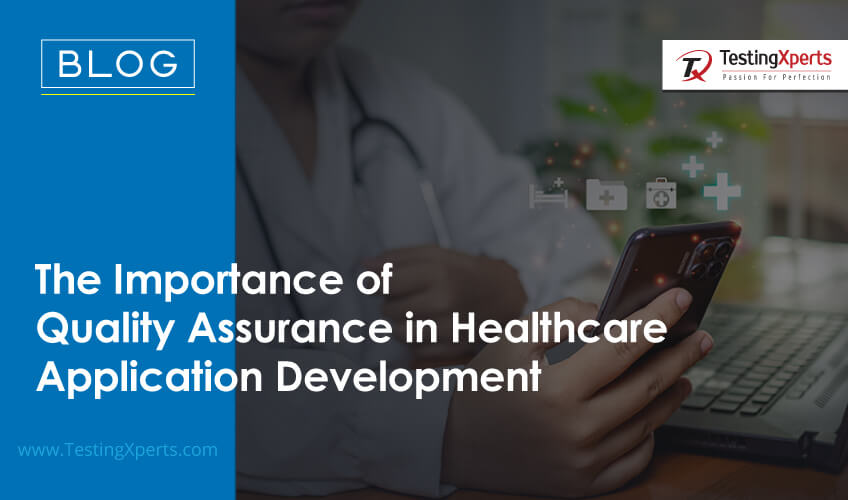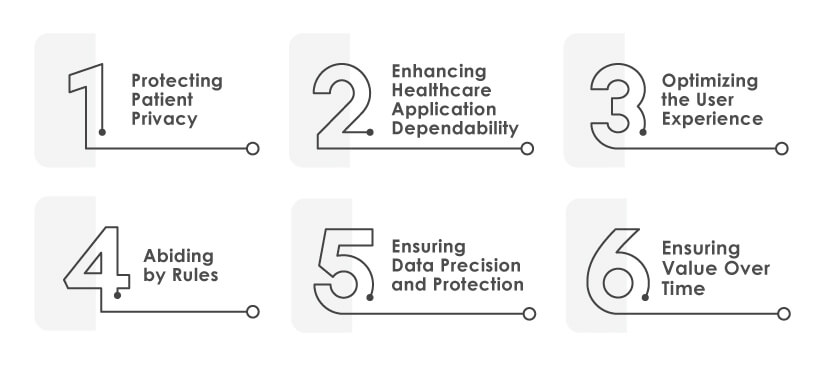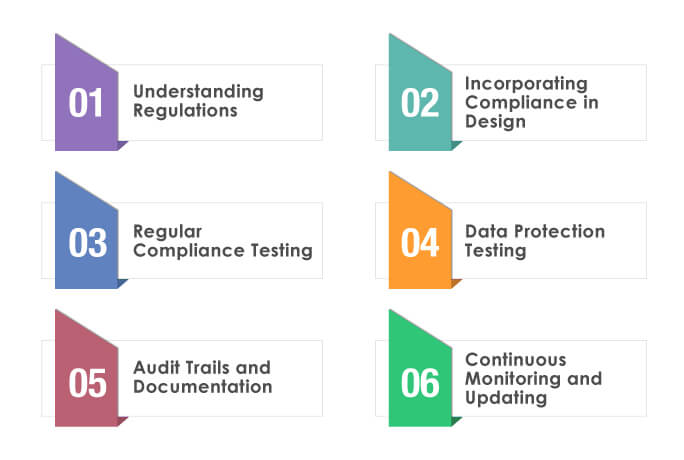
- Objective of Quality Assurance in Healthcare App Development
- Regulatory Compliance and Testing
- User-Centric Testing Approaches
- Testing Electronic Health Records (EHR) Systems
- Types of Testing in Healthcare Applications Development
- Conclusion
- Why Choose TestingXperts for Healthcare App Testing?
In recent years, insufficient care has been a significant concern in the healthcare industry, particularly in the low and middle income nations. According to statistics, somewhere in the range of 5.7 and 8.4 million deaths every year happen as a result of poor health care in these regions, representing up to 15% of all deaths. This highlights the concerning results of inadequate quality in healthcare, equating to a staggering $1.4–1.6 trillion every year in lost productivity.
Ensuring high quality is crucial for healthcare IT projects, though this area often receives inadequate attention. With the rise of digital healthcare infrastructure, ensuring high quality apps has become critical for healthcare application development teams. Traditional software development practices commonly fail to prioritize quality assurance, especially in early phases. Neglecting QA can produce widespread repercussions beyond financial costs, impacting patient care. For example, overlooking quality planning from the start may yield products providing initial benefits yet eventually causing serious clinical or economic problems.
Quality assurance in healthcare application development involves more than coding or software standards, such as ensuring a high-quality user experience, data security, and ease of use. This means promoting a culture of collaboration with customers by involving diverse testing teams early on and optimizing the overall user experience as a central part of the quality assurance process. By embedding these principles, healthcare technology can better fulfil its promises of better patient care and seamless functionality of healthcare mobile applications or systems. It can deliver functional solutions while enhancing how users interact with the systems.
Objectives of Software Testing in Healthcare
When developing healthcare applications, ensuring high quality is crucial. Quality assurance aims to create apps that function properly from technical, safety, and usability perspectives. This approach is vital as healthcare apps are often used in critical situations, so any issues could seriously impact patients. Effectiveness, security of sensitive data, and easy navigation are rightfully prioritized to prevent potential harm from malfunctions or design flaws.

Protecting Patient Privacy
A top priority for QA is avoiding patient harm. This necessitates rigorous app testing to guarantee it provides precise medical data, preserves patient record confidentiality, and does not mislead or disadvantage patients.
Enhancing Healthcare Application Dependability
In a medical environment, where decisions dependent on application information can affect lives, dependability is non-negotiable. Quality assurance recognizes possible failure factors in the application to confirm it performs accurately in all scenarios, consequently decreasing the risk of incorrect information that may result in improper medical judgments.
Optimizing the User Experience
For both healthcare providers and patients, ease of use is essential. Quality assurance guarantees the app’s intuitive design allows users to locate what they require without complication or postponement easily. This involves streamlining the interface for various user categories with differing levels of technical proficiency.
Abiding by Rules
Medical applications necessitate adherence to HIPAA, GDPR, and other guidelines. Quality assurance confirms apps are engineered based on these regulations, which administer individual health data protection, confidentiality, and other vital facets.
Ensuring Data Precision and Protection
Due to the delicate nature of healthcare information, quality assurance guarantees the correctness and security of the data handled by the application. This involves thorough data confirmation and protection measures to avoid data leaks or misrepresentations.
Ensuring Value Over Time
QA helps recognize and fix problems early during development, making it more cost-efficient than implementing changes after deployment. This forward-thinking methodology protects healthcare organizations from future costs associated with application changes and legal responsibilities.
Role of Regulatory Compliance Testing in Healthcare App Development
Maintaining legal adherence in healthcare software development is not merely a mandatory necessity but a fundamental aspect of ensuring trust and protecting sensitive patient information. This process demands a thorough methodology, from comprehending applicable regulations to continuous tracking and changes. Let us know in detail

Understanding Regulations
The initial phase is about understanding applicable regulations and benchmarks. In the US, this includes HIPAA, which establishes stringent directives for individual medical information privacy and protection. In the UK, engineers must adhere to the Information Protection Act 2018 and the UK GDPR, which similarly manages the managing of personal wellness records.
Incorporating Compliance in Design
Adherence to regulations should also be implemented in the app’s design. This beforehand way incorporates aspects synchronising with juridical benchmarks, such as encrypted information protection, client validation, and access administration. The objective is to design an application where consistency is not an afterthought but a fundamental quality.
Regular Compliance Testing
Continuous evaluation guarantees the app satisfies regulatory standards over the long run. This requires initial evaluation and consistent testing to adapt to legal modifications or updates. It’s a persisting cycle of assessment, remarks, and enhancement to uphold compliance standards.
Data Protection Testing
When evaluating healthcare applications, ensuring patient privacy is important. A thorough analysis focuses on how well the app safeguards sensitive medical information. Through rigorous testing, testers can assess the security measures against potential data breaches. The evaluation makes certain that transmission and storage preserve both the integrity and confidentiality of data.
Audit Trails and Documentation
It is essential to keep comprehensive records of all compliance-related work. This incorporates audit trails that monitor data access and changes and documentation of all compliance efforts. These files are critical for proving adherence to regulatory standards and can be invaluable in legal matters. Detailed records showcase precisely what has been done to fulfil requirements.
Continuous Monitoring and Updating
Regulations in healthcare are constantly evolving, with frequent modifications to rules and criteria. Continually tracking these alterations and promptly changing the app is essential to guarantee continuing adherence. This requires a committed approach to remain informed about the newest regulatory updates and to incorporate these into the app’s functionalities and safety measures.
User-Centric Testing Approach

The user-centric testing approach ensures the application aligns with its users’ real-world requirements and expectations, including patients, healthcare professionals, and administrative staff. This process involves a deep understanding of the user journey within the app, focusing on identifying and evaluating the essential tasks and scenarios that users are likely to experience. The aim is to make the app functional, intuitive, and responsive to user needs.
Key strategies in testing an app with users in mind include usability testing. In this, real app users directly assess the interface and functionality. They provide insights into how easy, or difficult the app usability is and its overall experience. Scenario-based testing is another important part in which real-life situations are simulated to see how the app performs in different contexts. Accessibility testing guarantees that the app can be used by people with various abilities, including those with visual or physical impairments.
Additionally, beta testing involves releasing an early version of the app to a select group of users before full release. This allows for comprehensive user feedback collection. It also provides an opportunity to make necessary changes and ensure that the final product is technically reliable.
Testing Electronic Health Records (EHR) Systems
Verifying that Electronic Health Records (EHR) systems function properly is essential for healthcare industry, focused on making sure these systems are trustworthy, secure, and effective when handling sensitive patient information. EHR systems are complex, combining many patient details and connecting with various medical technologies. Functional testing plays a crucial role in this process, confirming that all system capabilities perform as intended, from correctly entering patient data to finding health records when needed. This guarantees that healthcare providers can rely on the system to supply accurate patient details.

Additionally, security and privacy testing are necessary due to the sensitive nature of health records. This involves thorough examinations to protect data against unauthorised access and to comply with stringent regulations. Integration testing is crucial, ensuring seamless data exchange with other hospital systems and medical devices. Performance and usability testing ensures the system performs well under high traffic and data loads while focusing on healthcare providers’ user experience, ensuring the system is intuitive and efficient in real-world medical settings. Finally, compliance testing ensures adherence to healthcare standards and legal requirements, a vital step for the lawful and ethical management of patient data. This multifaceted approach to testing EHR systems is essential to support healthcare practitioners effectively and enhance patient care delivery.
Types of Testing in Healthcare Applications Development
When creating healthcare apps, teams must complete comprehensive testing to guarantee the application works as expected, stays secure and is easy to use. Developers run several tests to check the app from various angles, like whether it works as intended and quickly, in addition to if patient records are protected based on medical standards.

Functional Testing
Functional testing involves thoroughly validating each function of an application to ensure all features perform as intended. This process verifies that the workflow is cohesive, the user interface is clear and operates smoothly as expected. Careful functional testing confirms that the application works according to specifications.
Security Assessment
Healthcare requires robust security due to the sensitive nature of patient information. Thorough evaluations test for weaknesses that could enable data breaches. Evaluators ensure the app’s encryption, access restrictions, and data safeguards shield confidential records from improper access.
Performance Testing
Ensuring an application can withstand high usage volumes is crucial. Specifically, performance testing verifies an app’s ability to process many simultaneous users or large datasets without issue. This form of evaluation examines an app’s speed, dependability, and potential to perform seamlessly under pressure. The goal is to confirm the software remains functional and efficient even under stress.
Usability Testing
Ensuring an intuitive user experience is crucial. This process involves having real people interact with the application as usual and observing how users navigate the design and complete the expected tasks provides valuable insight. Any points of confusion or frustration can be identified and addressed before the app release. The overall goal is to improve the user experience through an empirical evaluation directly with members of the target audience.
Compliance Testing
Strict regulations in healthcare necessitate ensuring apps follow regulations governing patient data privacy and security. This testing confirms that the app complies with statutes like the UK’s GDPR, which oversees patient information. Compliance testing is critical to avoiding legal troubles and making certain the app is secure for patient use.
Integration Testing
Healthcare apps need to work seamlessly together with other systems. This type of testing examines an app’s ability to integrate and function without issues alongside various electronic health records, diagnostic tools, and other healthcare technologies. Coordination between these different pieces is critical, ensuring proper interaction is evaluated.
Accessibility Testing
Ensuring healthcare applications are usable by everyone, regardless of ability, is crucial. When access to information can save lives; apps must prioritize universal design. Developers test how well people with visual, hearing, motor, and cognitive disabilities can operate programs. Adhering to standards like the Web Content Accessibility Guidelines helps create legally compliant, easy-to-use apps. This inclusive development improves equitable access to health information and services, leading to better health results. Moreover, accessible apps tend to benefit all users through superior usability.
Conclusion
Quality assurance plays a crucial role in developing healthcare applications. Putting electronic health record systems and other healthcare software through rigorous testing confirms they operate dependably while also safeguarding sensitive patient data, complying with relevant regulations, and facilitating simple, intuitive use for medical providers. This process protects the sensitive information of those receiving care, enhances the usability of apps for health professionals, and ultimately contributes to more efficient and safer patient care. As digital technology in healthcare progresses, thorough quality assurance and testing will remain fundamental, confirming these advancements truly aid patients and healthcare workers alike.
Why Choose TestingXperts for Healthcare App Testing?
Partnering with TestingXperts for healthcare application testing will guarantee you thoroughness, expertise, and a profound understanding of the exclusive challenges and regulations of the healthcare sector. As a specialized testing assistance provider, TestingXperts combines experienced professionals, leading-edge technology, and a tailored method for each project.

• Our QA experts have a thorough grasp of regulations related to healthcare, allowing them to verify that applications align completely with applicable rules.
• We effectively find and solve performance and usability issues by utilizing the most up-to-date QA techniques and strategies.
• We tailor individualized testing approaches for each healthcare application to address their distinct needs and specifications. Our strategies account for what makes each app unique so they can optimize effectiveness and performance.
• We place the highest priority on ensuring our testing methods securely protect personal patient information.
• Providing an optimal experience for the end-user is extremely vital to us, as we aim to test apps that are functional, intuitive, and easy to use.
To know more, contact our QA experts now.
Discover more
Get in Touch
Stay Updated
Subscribe for more info




